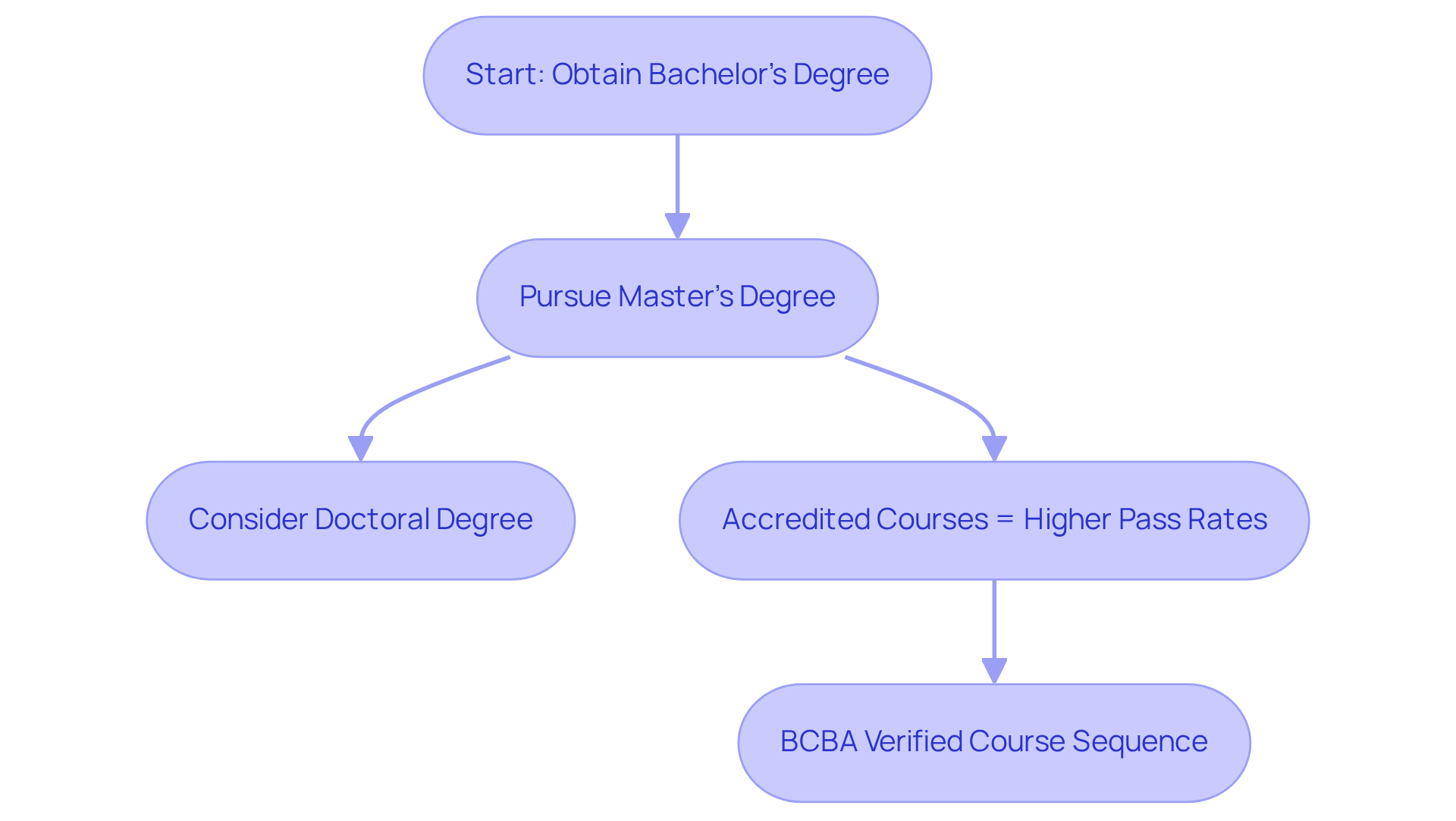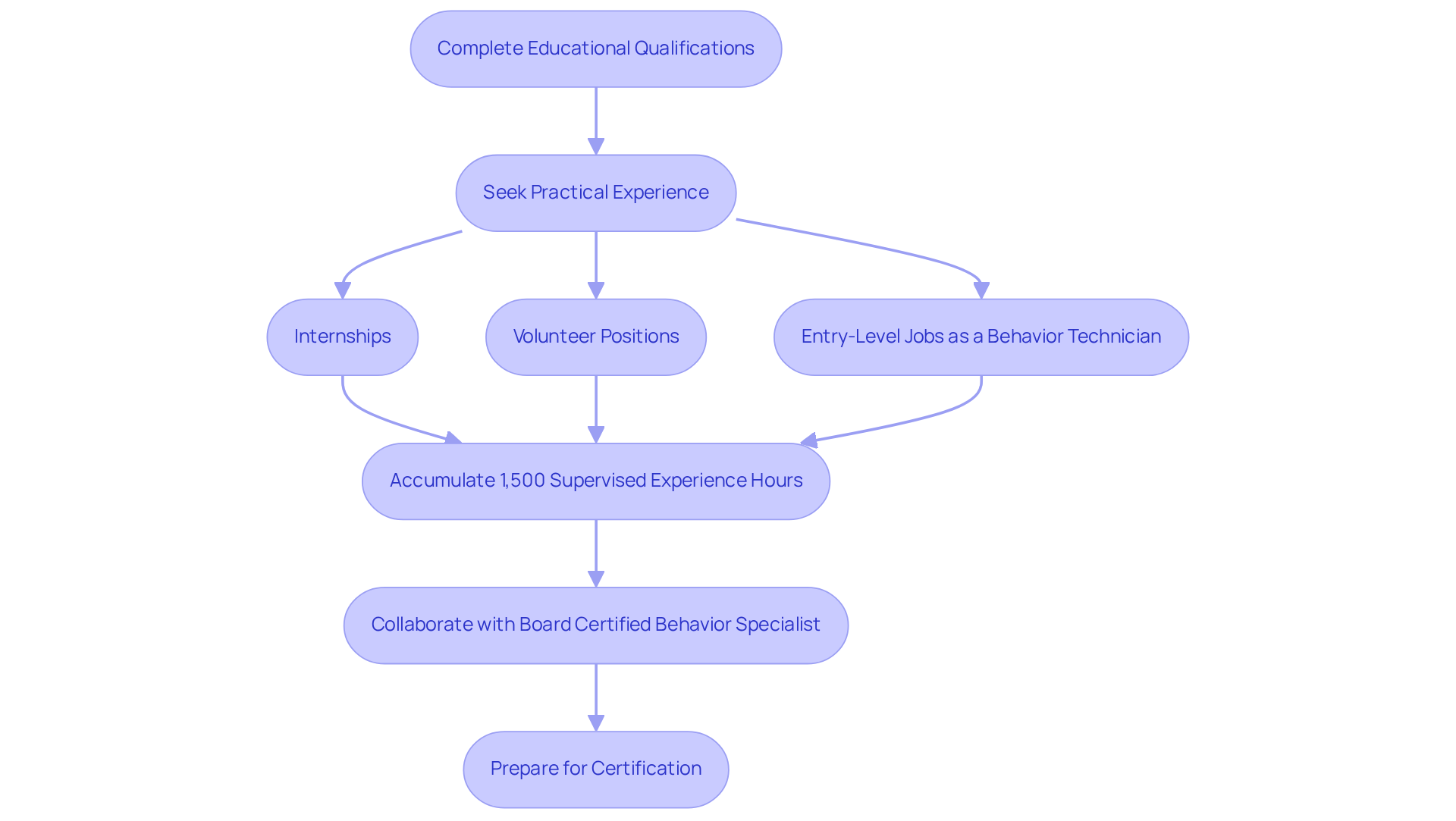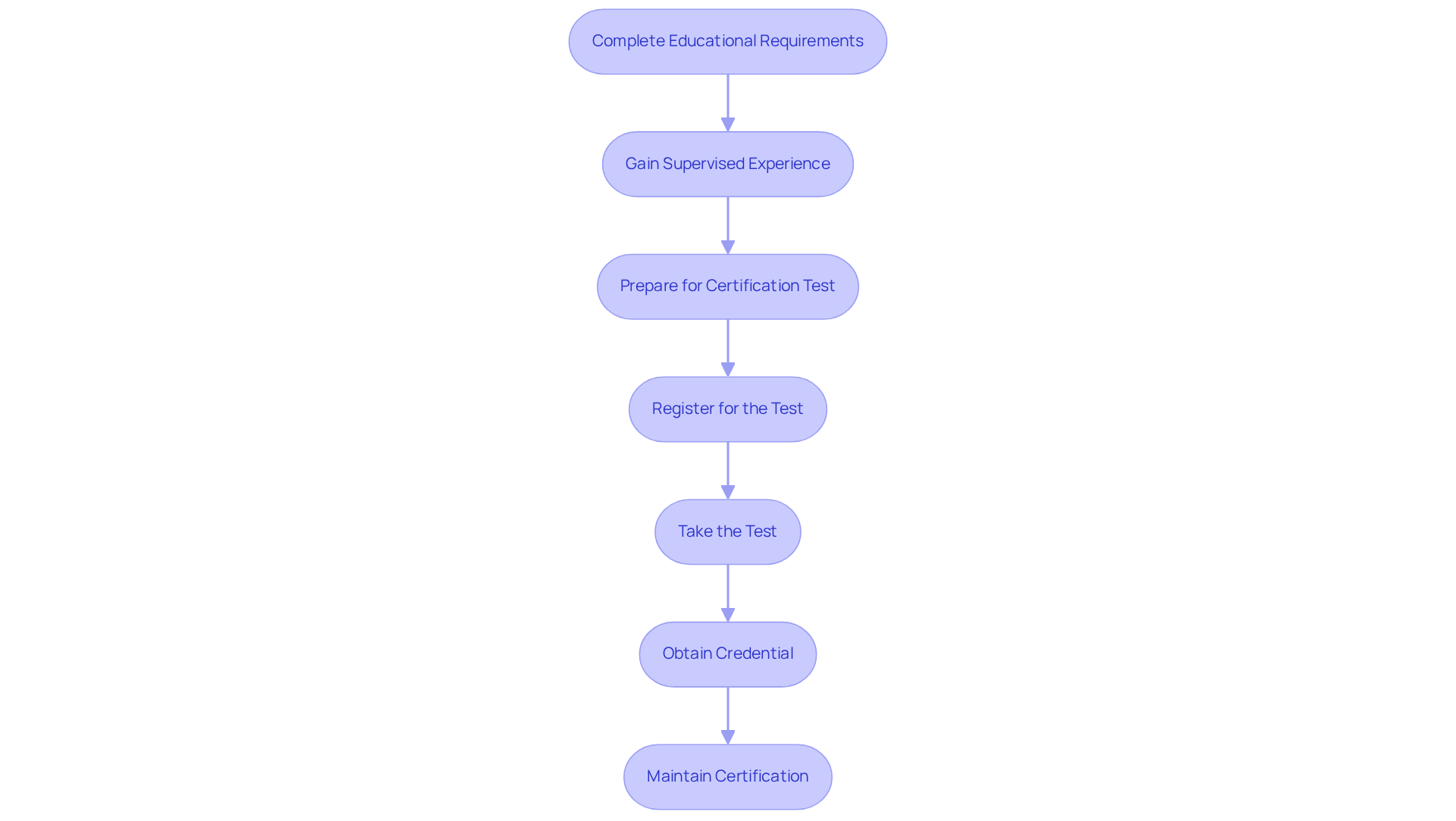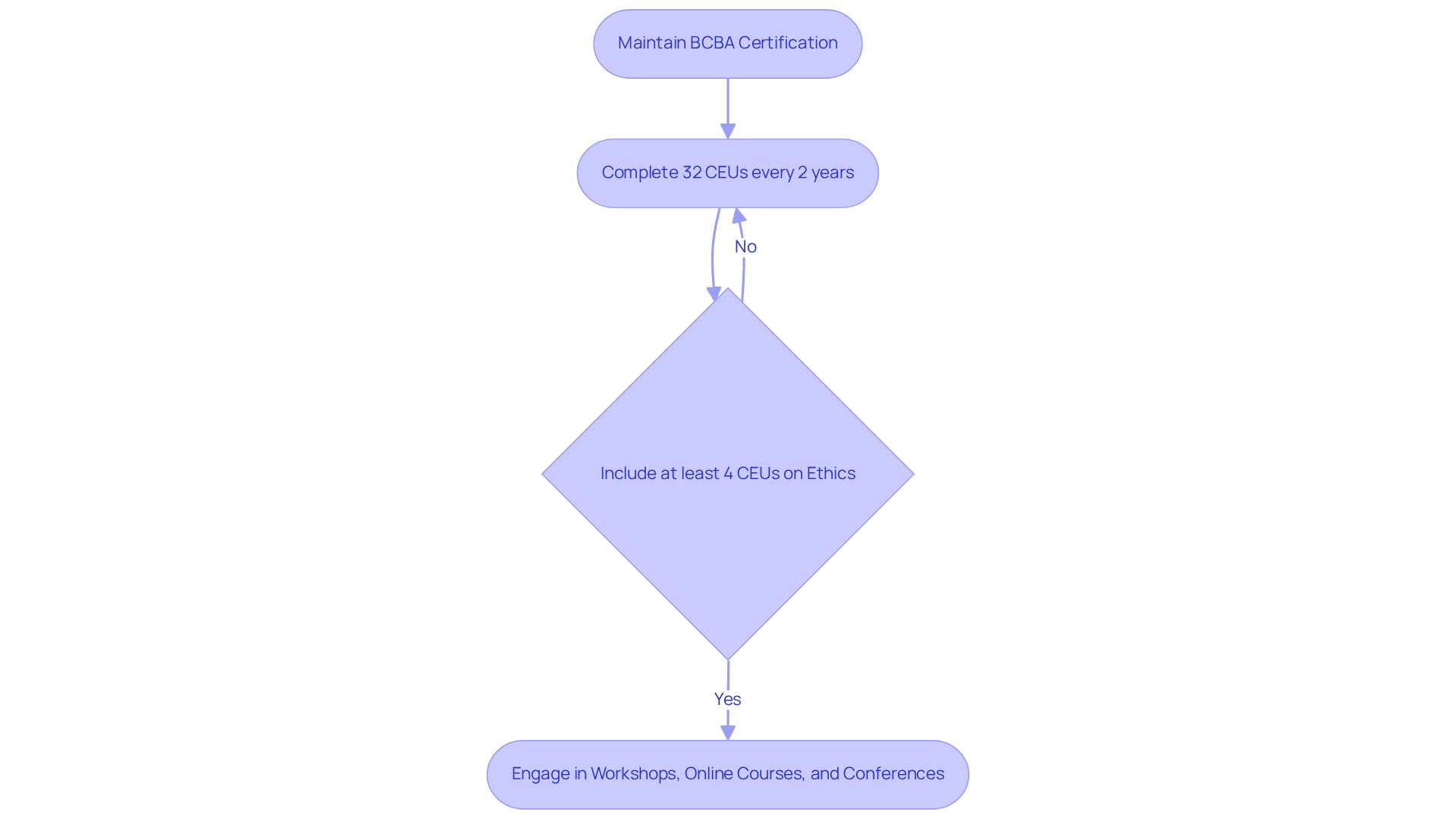June 22, 2025

To become a behavioral therapist, one must complete relevant educational qualifications, gain practical experience in Applied Behavior Analysis (ABA), achieve certification as a Board Certified Behavior Analyst (BCBA), and maintain that certification through continuing education.
The demand for BCBAs is significant, highlighting the importance of accredited programs and hands-on experience. These elements are critical for successful certification and effective practice in the field.
By following these essential steps, aspiring therapists can position themselves for success and make a meaningful impact in their communities.
Aspiring behavioral therapists are entering a field experiencing an unprecedented surge in demand, evidenced by a staggering 1,942% increase in Board Certified Behavior Analysts (BCBAs) from 2010 to 2018. This rapid growth underscores the critical importance of proper educational qualifications and the necessity of hands-on experience in Applied Behavior Analysis (ABA) therapy.
Readers will uncover the essential steps to embark on this rewarding career path, from obtaining relevant degrees to achieving certification and ensuring ongoing professional growth. Yet, with a multitude of educational paths and certification requirements, how can one navigate these complexities to secure a successful entry into this vital profession?
To learn how to become a behavioral therapist, start by earning a bachelor's degree in a relevant field such as psychology, social work, or applied behavior analysis (ABA). This foundational education typically spans four years. Following this, pursuing a master's degree in counseling or a related discipline is often essential for advanced positions. Your curriculum must include coursework in behavior analysis, as this is crucial for future qualifications. Notably, about 75% of accredited curricula provide a BCBA Verified Course Sequence, which is vital for meeting certification requirements.
Research indicates that ABAI-accredited courses demonstrate higher pass rates than non-accredited ones, underscoring the importance of selecting a quality educational path. For those aiming for higher-level roles in understanding how to become a behavioral therapist, a doctoral degree may also be beneficial, although it is not mandatory for entry-level positions.
Recent trends reveal a growing emphasis on accredited courses, reflecting the rising demand for qualified Board Certified Behavior Analysts (BCBAs) in the field, which saw an astonishing increase of 1,942% from 2010 to 2018. Additionally, variability in Verified Course Sequence programs concerning practicum support may influence student readiness for the certification exam.
Prospective students should also note that the BCBA® Verified Course Sequence has a rolling admissions process, allowing applications to be submitted year-round.

Upon completing your educational qualifications, it is crucial to seek opportunities for practical experience to learn how to become a behavioral therapist in ABA therapy. Did you know that there is a projected 25% increase in demand for Board Certified Behavior Analysts (BCBAs) over the next five years? This presents a significant opportunity for those entering the field. You can gain this experience through:
Aim](https://hireaba.today) to accumulate at least 1,500 hours of supervised experience, as this is often a prerequisite for qualification. Collaborate closely with a Board Certified Behavior Specialist during this time to learn best practices and enhance your skills in executing behavior intervention plans.
Documenting your hours and experiences meticulously will not only prepare you for certification but also position you favorably for emerging opportunities in this booming field, including higher salaries and flexible working conditions. Are you proactive in exploring leadership and remote roles that can enhance your career while allowing you to influence more lives? By taking these steps, you can ensure that you are not only ready for certification but also prepared with the knowledge of how to become a behavioral therapist to seize the opportunities that lie ahead.

To attain Board Certification as a Behavior Analyst, candidates must successfully complete the certification test after meeting educational and supervised experience criteria. It is crucial that your master's curriculum features coursework accredited by the Behavior Analyst Certification Board (BACB), guaranteeing you are well-prepared for the test. Yearly, thousands of applicants sit for the certification test, with an average success rate of around 65% for first-time candidates, and a greater success rate of 67% for individuals from accredited programs. This data suggests that with sufficient preparation, achievement is possible.
Candidates should typically allocate several months for BCBA certification preparation. Once you feel prepared, sign up for the assessment through the BACB website. The assessment comprises 150 multiple-choice questions that assess your comprehension of behavior analysis principles and their practical applications. To pass, candidates must achieve a scaled score of 400 or above. Numerous accomplished BCBAs highlight the significance of developing a well-organized study plan, utilizing top-notch study resources, and engaging in active learning methods like practice assessments and study groups.
Upon passing the exam, you will obtain your credential, which permits you to practice as a BCBA. This qualification not only enhances your career opportunities but also signifies your dedication to ethical practices and continuous professional growth in the area of Applied Behavior Analysis. Furthermore, BCBAs must uphold their credentials through recertification every two years, ensuring ongoing compliance with the highest standards in the field.

Once certified, maintaining your BCBA certification is crucial. You are required to complete 32 continuing education units (CEUs) every two years, including at least 4 CEUs focused on ethics. Have you considered how engaging in workshops, online courses, and conferences approved by the BACB can fulfill these requirements? Staying informed about new developments in the field is essential for understanding how to become a behavioral therapist, as it enhances your skills and increases your effectiveness. Regularly checking the BACB website for updates on CEU requirements and available courses is essential for your professional growth.

To embark on a successful career as a behavioral therapist, one must recognize the growing demand for Board Certified Behavior Analysts (BCBAs) and follow a structured path that encompasses:
Each of these steps is pivotal in shaping a competent and effective therapist capable of making a meaningful impact in the lives of clients.
The journey commences with a solid educational foundation, typically involving a bachelor's degree followed by a master's degree in fields related to behavior analysis. Practical experience is equally crucial, as it allows aspiring therapists to apply their knowledge in real-world settings. Achieving certification as a BCBA further validates one's expertise and dedication to ethical practices. Finally, maintaining certification through continuing education ensures that therapists remain current with the latest developments in the field, thereby enhancing their skills and effectiveness.
Ultimately, the path to becoming a behavioral therapist transcends merely meeting requirements; it embodies a commitment to lifelong learning and professional growth. By actively pursuing these steps, individuals can position themselves for a rewarding career that not only fulfills personal ambitions but also significantly contributes to the well-being of others. Taking action today can lead to a future filled with opportunities to make a lasting difference in the field of behavioral therapy.
What is the first step to become a behavioral therapist?
The first step is to earn a bachelor's degree in a relevant field such as psychology, social work, or applied behavior analysis (ABA), which typically takes four years.
Is a master's degree necessary for becoming a behavioral therapist?
Yes, pursuing a master's degree in counseling or a related discipline is often essential for advanced positions in the field.
What coursework is important for aspiring behavioral therapists?
Coursework in behavior analysis is crucial, and about 75% of accredited curricula provide a BCBA Verified Course Sequence, which is necessary for certification.
Why is it important to choose accredited courses?
Research indicates that ABAI-accredited courses have higher pass rates for certification exams compared to non-accredited ones, making the selection of a quality educational path essential.
Is a doctoral degree required to become a behavioral therapist?
A doctoral degree may be beneficial for higher-level roles, but it is not mandatory for entry-level positions.
What recent trends have been observed in the field of behavioral therapy?
There has been a significant increase in the demand for qualified Board Certified Behavior Analysts (BCBAs), with a growth of 1,942% from 2010 to 2018.
How does the variability in Verified Course Sequence programs affect students?
Variability in practicum support within Verified Course Sequence programs may influence student readiness for the certification exam.
Can students apply for the BCBA® Verified Course Sequence at any time?
Yes, the BCBA® Verified Course Sequence has a rolling admissions process, allowing applications to be submitted year-round.
Our expert recruitment strategies and AI-driven sourcing ensure that you receive top-notch candidates quickly, without compromising on quality. Whether you’re looking for BCBAs, Clinical Directors, or RBTs, we’ve got you covered.